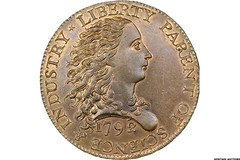
PREV ARTICLE
NEXT ARTICLE
FULL ISSUE
PREV FULL ISSUE
REPORTER INTERVIEWS KRALJEVICH ON COIN RARITIES
John Kraljevich was interviewed for an article on coins for the financial site Mainstreet.com. Here's an excerpt. -Editor
“Only four were struck and they were handed to VIPs: Jefferson Davis got one,” says John Kraljevich, a senior numismatics consultant for Stack’s Bowers Galleries and independent rare coins business owner. Confederate coin production didn’t get far, not because of the Civil War, but because the amount of silver it took to manufacture the coins ended up costing more than the coins were worth. Instead, the Confederacy opted to use Mexican coins instead, which were easy to come by, according to Kraljevich. “They were the only coins ever produced by the South,” he says. Those weren’t the only coins to have problems incorporating silver into their manufacture. The 1792 silver-center cent had a hole drilled into the middle, which was fitted with a silver bit. The idea for the silver plug can be traced back to correspondence between Thomas Jefferson and Thomas Paine. “Paine came up with the suggestion that the coin should be three-fourths copper and a quarter of silver put together,” says Kraljevich. The Founding Fathers and minters were afraid the coin wouldn’t be taken seriously, and they felt adding silver would give the coin some monetary weight, says Kendrella. But it also gave the coin more physical weight, and because of that and also because of technological difficulties in manufacturing it, it was discontinued. Speaking of silver, the half-disme comes with its own slice of American lore. According to Kendrella, the legend goes something like this: George Washington, in an effort to speed up the coinage process after enacting the Mint Act, melted down his own silver cutleries to make those 1,500 silver half dismes of 1792. It’s a good story, but the buck stops there. According to Kraljevich, the tale should be thoroughly filed under legend. “It was actually Jefferson who recorded depositing silver at the U.S. mint in Philadelphia in 1792, then received 1,500 half dismes back from the mint just a few days later," says Kraljevich. "So either someone misremembered and confused Washington for Jefferson in the 1840s or it's just totally made up.” The Birch cent, along with the silver cent piece, were precursors to the penny, which was first struck with 100% copper in 1793. In 1982, the penny was replaced with copper-plated zinc. So what makes rare coins so special? In Kraljevich’s view, it’s because many coin collectors started as kids, became successful and are now able to spend as much as they want on their collection. “They recall those childhood memories of, ‘Wow it’d be really cool to own that,’" Kraljevich said. "It’s one of those things that some of those people are striving to own—it’s, ‘I’ve wanted to own these my whole life.'”
Nice job! It's good to see an article in the general press that doesn't get the numismatic facts mangled. -Editor
To read the complete article, see:
Wayne Homren, Editor The Numismatic Bibliomania Society is a non-profit organization promoting numismatic literature. See our web site at coinbooks.org. To submit items for publication in The E-Sylum, write to the Editor at this address: whomren@gmail.com To subscribe go to: https://my.binhost.com/lists/listinfo/esylum All Rights Reserved. NBS Home Page Contact the NBS webmaster 
|
